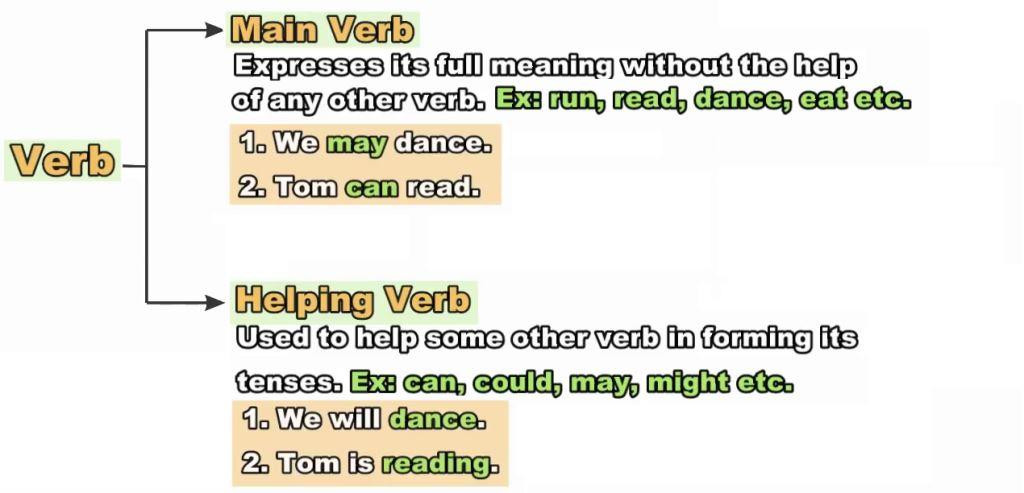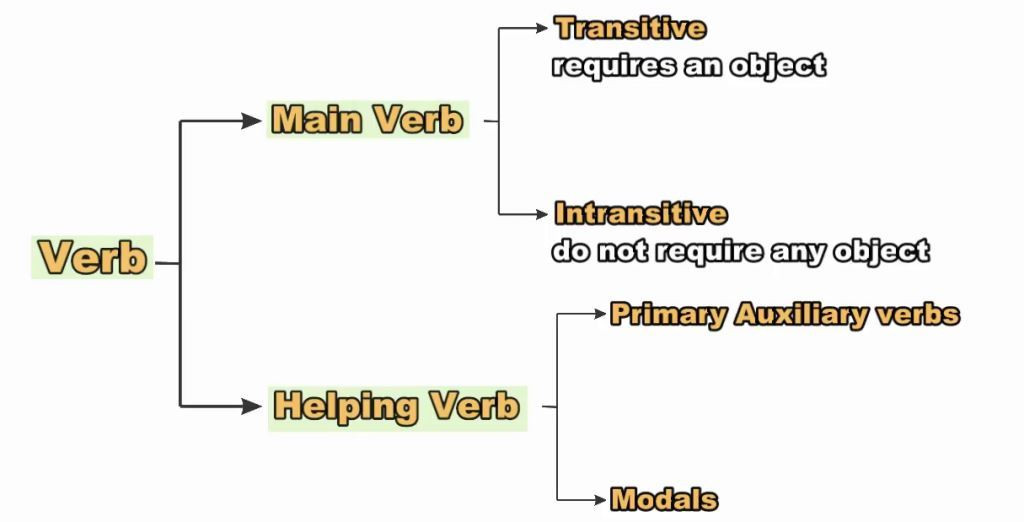Verb
Verb
Verb is a word which tells or asserts something about a person or thing. In simple terms, it shows that some work is being done. So, we can say, Verb is a doing word.
► Verb may tell what a person or thing does or what is done to a person or thing.
- Sheena runs.
- I am reading blogs from ScoreKhel.com etc. Here, run and reading are verbs
Verbs are divided into two main classes:

Main Verbs and Helping Verbs are further classified as

Transitive & Intransitive Verbs
Transitive Verbs are those verbs that require an object to make its sense clear.
Transitive Verbs List: discuss, describe, reach, order, tell, attack, demand, resemble, ridicule, comprise, invade, resist, Join, affect, ensure, demand, accompany, investigate, grab, empower, praise, impress, inflate, assure, shine, hold, engage, excited, buy, touch, wrap, drive, dominate, trick, reduce, love, soothe etc. are some important transitive verbs.
Example: While she was returning from hospital, a ruffian attacked on her. (incorrect)
As attacked is a transitive verb therefore an object is required with it. Hence, correct sentence will be
While she was returning from hospital, a ruffian attacked her. (correct)
Intransitive Verbs are those verbs that do not require any object to make its sense clear.
Intransitive Verbs list: agree, appear, arrive, become, belong, depend, laugh, remain, rise, sit, sleep, stand, wake, wait, act, adapt, dance, fall, fly, grow, jump, left, listen, panic, read, relax, roll, run, shake, shout, skip, smell, swim etc. are some important intransitive verbs.
Example: This plant grew rapidly. (correct)
- He ran around the field.(correct) (no object is used after grew & ran as they are intransitive verbs.)
Note: Sometimes transitive verbs can be used as intransitive & vice-versa. Therefore, we must learn to try to memorize the transitive verb list and do the proper practice of it. Some transitive verbs can take two objects; they are called ditransitive verbs. Like:- he gave me a book. | ‘me’ is the indirect object and ‘the book’ is the direct object in the sentence. Questions are usually asked from this section in competitive exams in India, therefore we should understand this concept properly. Knowledge of these verbs is also helpful in active-passive (voice) conversions.
Primary Auxiliary Verbs & Modals
These Verbs help some other verb (main verb) in forming its tenses.
► In primary Auxiliaries we have be, do & have forms of Verb.
- Be form – is/are/ am/ was/ were
- Have form- have/ has/ had
- Do form – do/ does/ did
► In Modals we have – can, could, might, shall, should, used to, dare etc.
Note: Rules related to the Helping Verb are discussed later in the Course.
Full Syllabus in 1 Video [Contains Everything basic to advance]